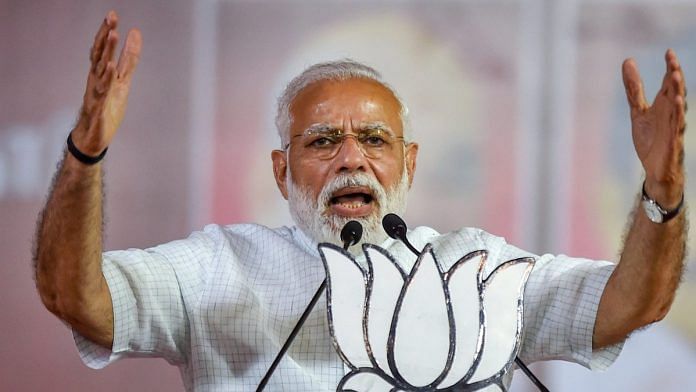Politics from the pulpit
Suhas Palshikar | Pune-based professor of political science
The Indian Express
Palshikar argues last week’s Modi-Shah press conference illustrates not only Prime Minister Narendra Modi’s reluctance to face the media “impromptu”, but also the relationship between political leaders and the public in a democracy.
A democracy has the potential of introducing a “levelling effect’’ by allowing a “public questioning” of leaders –any journalist can `hurl’ a tough question at them. However, Modi’s leadership is all about a one-way communication where he is “the preacher — the giver”, who refuses to submit to questioning. Modi represents politicians—like Naveen Patnaik, Mayawati or Jayalalithaa– who are unwilling to be “tested” or examined. If leaders “avoid media scrutiny”, what does it say of their commitment to the “democratic culture of political equality”, asks Palshikar.
Why Modi May Be Winning
R Jagannathan | Editorial director of Swarajya
The Times of India
Jagannathan draws six general conclusions from the 2019 exit polls to suggest why Prime Minister Narendra Modi will win on 23 May. First, a visible and strong leader is a “definite plus” instead of a ‘rag-tag’ Opposition. Second, economic performance or “non-performance” alone doesn’t determine who will win or lose. Third, “opportunist alliances” based on caste or religious arithmetic may not ensure a victory. Four, coalitions without a national party and a strong leader will “flounder”. Five, “fake secularism” is past its “sell-by date” and Muslims will be 23 May’s biggest losers because of it. And finally, Lutyens’ Delhi is out of tune with emerging consumer classes who are aspirational and find Modi as someone who “talks their language”.
Why the BJP is not invincible in Uttar Pradesh
Zoya Hasan | Professor emerita of JNU and distinguished professor of Council for Social Development
The Hindu
Hasan says BJP is finding it difficult to repeat its 2014 performance in Uttar Pradesh this time. The party will not be invincible in the state because of several factors — primary are an anti-establishment sentiment related to economic factors, and the rise of the mahagathbandhan. However, Modi is popular among the upper castes, youths and non-Yadav backward castes. “Hindu voter consolidation” and “caste mobilisation” will be the two factors to impact the UP results. The mahagathbandhan represents “Mandal 2.0” with its coalition of Yadavs, Jatavs and Muslims, and this will challenge the BJP’s caste-based Hindutva politics. Hasan feels Hindu nationalism “has certainly gained” in UP, but believes “this too will change”.
An amusing show
Ashok V. Desai | Economist and former chief consultant with Finance ministry
The Telegraph
Desai uses the example of political leaders like US President Donald Trump to assert that democracies across the world have shown that morality is irrelevant. He says what makes American presidents “special” is their ability to “combine administration with entertainment”. He cites Bill and Hillary Clinton and Trump (particularly in the context of the Mueller report on Russian interference in 2016 US presidential elections) to support his argument.
Desai also refers to WikiLeaks founder Julian Assange who might end up in jail if Britain agrees to its “friend” America’s request. He details Assange’s life from his childhood to the time he took asylum in the Ecuadorian embassy in London and was arrested by British police on 11 April. The writer thinks democracy is “the greatest show on earth”, the best idea is to watch and “be amused”.
The national focus needs to be on the economy now
Ajit Ranade | Economist and senior fellow, Takshashila Institution
Mint
Ranade notes going by the exit poll trends the NDA will return to power. The government’s immediate focus should be on the economy, which is showing worrisome signs. The GDP has steadily fallen and the current account deficit is rising. Ranade underlines the need to explore the possibilities of rupee-linked trade with Iran — paying for oil imports from Iran in rupees will ensure that the seller doesn’t have to deal with US dollars. India must also boost tourist inflow, especially from China, to ease the bilateral trade deficit. The government’s honeymoon period must be used to move ahead decisively with some hard decisions.
The Huawei Hatchet
Harsh V Pant | Professor, Department of Defence Studies, King’s College
The Economic Times
As the US-China trade war intensifies, the Donald Trump administration has effectively banned Huawei from the American markets, writes Pant. Concerns have risen over China using Huawei for gaining access to critical infrastructure. Britain’s telecom service provider, BT, last year removed Huawei equipment from key areas of 4G network. New Zealand and Japan have also banned Huawei’s 5G equipment.
In India, which is preparing 5G service trials, “there is still a reluctance to frontally confront the challenge posed by the western pushback against Huawei”. As strategic competition between the US and China via trade and tech conflicts takes shape, India’s strategic space will shrink, Pant says and adds New Delhi has to adopt a long-term policy keeping in mind its own immediate interest while enhancing technological sinews.
Palliatives are no solutions
Mahesh Vyas | MD & CEO, CMIE
Business Standard
Vyas writes political parties are competing with each other to provide direct transfers to households, primarily because they have failed to provide quality jobs. To create and provide quality jobs, investments from the private corporate sector – best equipped to provide jobs — must be increased. It is critical to review the impact of “contractualisation”— contractual jobs are not good quality jobs like regular corporate jobs. While the government is outsourcing jobs, the private sector is contracting out jobs. “If this continues, India may be turned into the sweat shop of the world,” he says.
Employment guarantee and income transfers are short-term palliatives to extreme distress, but do not provide a solution.



